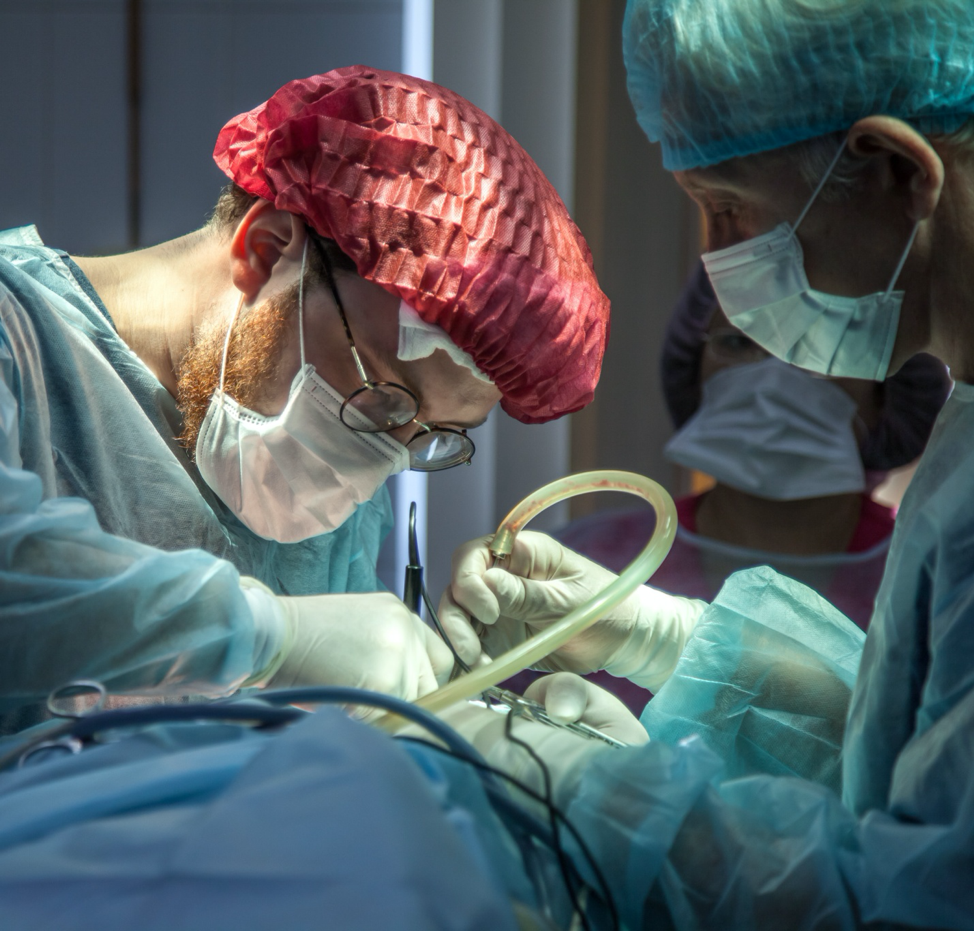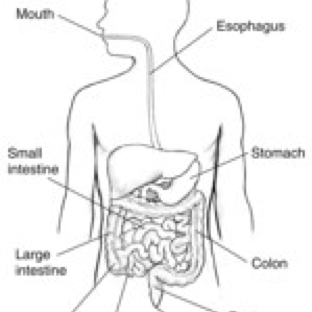CALL TODAY 646-846-1136 | EMAIL
Surgical Experts Dedicated to Improving Lives
At Lenox Hill Minimally Invasive Surgery PLLC, Dr. Valery Dronsky and his staff of medical professionals provide compassionate care with the highest ethical & professional standards. In our state of the art facility, we offer surgical services using only the most cutting edge and current procedures and treatments. We specialize in general surgery, including extensive experience in performing hernia repair surgery. Our expertise is in minimally invasive surgery and robotic surgery. Minimally invasive and robotic surgery often allow patients to experience easier recovery than traditional open surgery. They also allow for more precise and less traumatic surgery. When robotic and minimally invasive surgery is not an option, we are also skilled and experienced in traditional open surgical procedures.
Dr. Dronsky is an experienced and highly skilled surgeon having undergone extensive training in school, residency and fellowships. He practices medicine with ethical behavior, compassion and superb bedside manner. In the operating room he exhibits precision mechanical abilities, analytical thinking and the ability to visualize tissue in three dimensions. These innate and learned skills allow Dr. Dronsky to be one of the most dexterous and skilled professionals in New York City and the Country.
Call us: 646-846-1136
PATIENT TESTIMONIALS
Recent Awards
We are honored and deeply appreciative to have consistently received prestigious awards and recognition year after year, establishing us as one of New York’s foremost hospitals for a wide range of general surgeries, safety measures, specialized procedures, and overall excellence in healthcare. At Lenox Hill Minimally Invasive Surgery, our unwavering commitment lies in delivering exceptional care and unwavering support to our patients, guaranteeing their safety and successful recovery throughout their entire surgical experience.
Hospital Quality Awards
 America’s 50 Best Hospitals Award™ (2023, 2022)
America’s 50 Best Hospitals Award™ (2023, 2022)
Top 1% in the nation for providing the highest clinical quality year over year.

America’s 100 Best Hospitals Award™ (2021)
Top 2% in the nation for consistently delivering clinical quality year over year.

America’s 250 Best Hospitals Award™ (2023, 2022, 2021)
Top 5% in the nation for consistently delivering clinical quality.

Patient Safety Excellence Award™ (2023, 2022)
Top in the nation for providing excellence in patient safety by preventing infections, medical errors, and other preventable complications.
Specialty Clinical Quality Awards

America’s 100 Best Hospitals for Cardiac Care Award™ (2023, 2022, 2021, 2020, 2019)
Superior clinical outcomes in heart bypass surgery, coronary interventional procedures, heart attack treatment, heart failure treatment, and heart valve surgery.

America’s 100 Best Hospitals for Coronary Intervention Award™ (2023, 2022, 2021, 2020, 2019)
Superior clinical outcomes in coronary intervention procedures (angioplasty with stent).

America’s 100 Best Hospitals for Prostate Surgery Award™ (2023, 2022, 2021)
Superior clinical outcomes in prostate removal surgery and transurethral resection of the prostate.
Click to see all of our Healthgrades best doctors awards
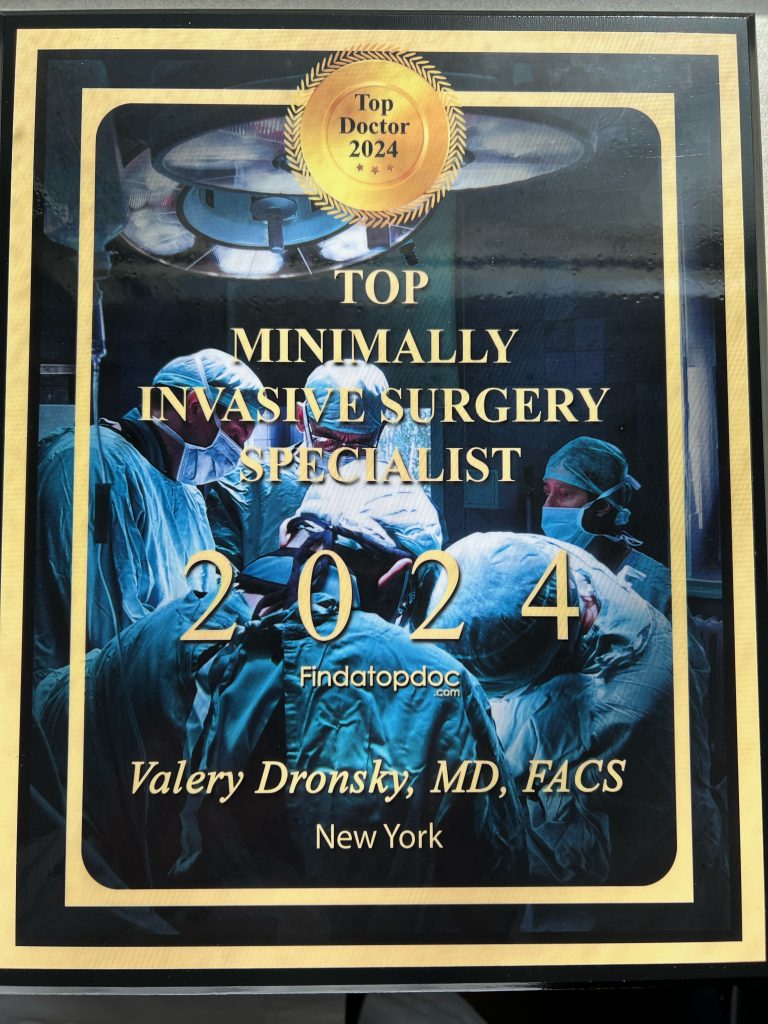
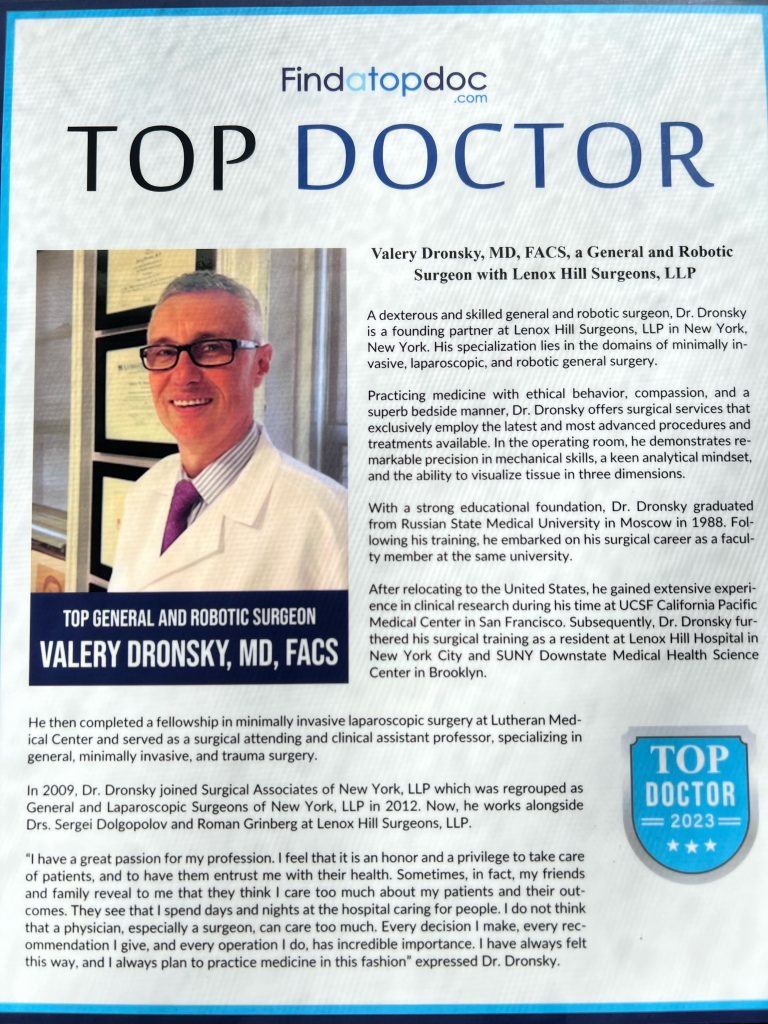


Visit our main website at www.LenoxHillMinimallyInvasiveSurgery.com
Blog Posts are Below:
Tag Archives: Esophagus Surgery
Esophagus Surgery
Esophagus surgery, known as esophagectomy, is a procedure to remove the swollen part of the tube between your stomach and mouth, called the esophagus. The surgery also helps rebuild the esophagus by using parts of other organs, mostly the stomach. This surgery is common in treating advanced esophageal cancer and is also used for Barrett’s esophagus if activated precancerous cells are growing.
Doctors also recommend esophagectomy for non-cancerous problems. For instance, if other procedures of saving the esophagus remained unsuccessful in the past, such as last stage achalasia or strictures. Or, after consuming anything that damages the wall of the esophagus.
Esophagus Surgery
Esophagus surgery can take place using two different techniques. No matter what method your doctor uses, esophagectomy is a complex surgery, and your doctor can also ask you to stay longer in the hospital. Make sure to consult a surgeon who has expertise in treating the esophagus cancer and performing its surgery. The two methods are:
Open Esophagectomy
In this surgery, the surgeon uses the open technique to treat your cancer. They operate by making one or more incisions (cut) in the neck, abdomen, and chest.
- If the primary cut is in the neck and abdomen, the surgery is called a transhiatal esophagectomy.
- If the primary cut is in the chest and abdomen, the surgery is called a transthoracic esophagectomy.
- Some procedures can take place through all three locations, the chest, neck, and abdomen.
You should discuss the surgery and its methods with your surgeon and ask what to expect in the surgery.
Minimally Invasive Esophagectomy
If the cancer is small or at an early stage, your surgeon will make several small cuts for removing the esophagus instead of a large incision. They put a laparoscope (a long thin tube with a light) in one incision to have the visuals inside your esophagus during the operation. The surgical tool goes inside your body through other cuts.
To perform this type of procedure accurately, your surgeon should be highly skilled and have years of experience to remove the esophagus through this method. Moreover, because of using small incisions, a person can go home early, have less blood loss, and have a faster recovery.
Why You Need Esophagectomy?
It is the primary surgical technique for esophageal cancer. It helps in removing cancer or relieving its symptoms. This surgery is important to treat your cancer; if not done, a patient’s life can be in danger. Moreover, because this is a chronic disease, the patient experiences severe pain and can’t eat anything due to esophagus cancer, which makes this surgery more vital to give relief to the person.
In an open esophagectomy, the doctor removes all or some place of the esophagus through cuts in the neck, belly, and chest. Then, the surgeon uses part of other organs to reconstruct the esophagus, which can be your stomach and small or large intestine.
Mostly, the esophagectomy is a minimally invasive surgery, performed either by robot assists or laparoscopy. If the patient’s situation is not very critical, then this method helps in avoiding pain and faster recovery.
Risk of Esophagus Surgery
Like any other surgery, this surgery also has possible risks and side effects. The following are some of them:
- Anesthesia reaction (anesthesia is a medication which aids patient to sleep during the surgery, so they don’t feel pain. Reaction can include rash, swelling, wheezing, and low blood pressure).
- Pneumonia
- Infection
- Blood clots
- Bleeding
- Voice changes
- Leakage from the area where the intestine or stomach connects with the esophagus
- Esophagus gets narrow, which leads to swelling
- Nausea
- Vomiting
- Heartburn
- Dumping syndrome (when food travels quickly from your stomach to the small intestine, which can lead to diarrhea, nausea, and feeling of fullness)
Consult Lenox Hill Minimally Invasive Surgery About Esophagus Surgery
Esophagus surgery is not a common one. It is a complex surgery that only highly qualified surgeons can perform. Plus, it’s a necessary procedure for patients who have esophagus cancer. Moreover, a person suffering from the esophagus disease should get the treatment as early as possible, so that their surgeon can save the other un-affected parts of the esophagus. Also, a patient is unable to eat and drink if they are in this condition.
The surgery also has risk and complications which can happen to anyone, especially if the surgeon lacks skills and experience. So, in this case, you need to find a surgeon who can treat your esophagus and save you from future problems.
Lenox Hills Surgeons have a dedicated team of surgeons who are experts in surgical precision. Our professional, qualified surgeons provide compassionate care to all patients and maintain the highest standards of hygiene during surgical procedures to avoid complications. If you want to know more or to schedule an appointment, visit our website or call us on 646-846-1136.
Esophagus Surgery – What to Expect
The esophagus is an essential aspect of digestion. Without it, you couldn’t naturally deliver food from your mouth to your stomach. However, there are some times where surgery needs to be performed on the esophagus. How does the esophagus work? What can go wrong and how can surgery help? What is recovery like for esophagus surgery?
How the Esophagus Works
The process of digestion begins as soon as food enters the mouth. The very first step in digestion is chewing, breaking down large chunks of food into smaller, more manageable pieces. Saliva is also brought into the mix to help chemically reduce the food as well. In order for the food to continue to be processed by the stomach, intestines, and other associated organs, it needs to travel down the esophagus. When we first think of it, we might imagine that the esophagus is simply a tube, similar to a straw. We may think that food simply falls down our throat and into our stomach, that the esophagus is a very simple structure. That could not be further from the truth! In fact, there are many muscles that are involved in delivering food from the mouth to the stomach. This can be seen by the fact that we can swallow sitting down, laying down, or even upside down.
Once food enters the esophagus, the smooth muscle tissue within the esophagus contract in a wave formation, gradually pushing food down our throat. Additionally, there are two valve-like structures, called sphincters, that block entrance two or exit from the esophagus. Without these sphincters, food in our mouth would instantly drop down to the stomach. Alternatively, digestive enzymes and juices could come up from the stomach, known as acid reflux.
What can go Wrong
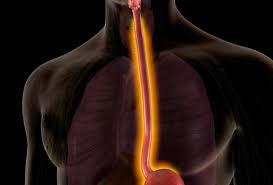 Clearly, the esophagus is more than just a hollow tube for swallowing. Because of the complex nature of the esophagus, there are a number of things that can potentially go wrong. As mentioned above, the sphincters within the esophagus are essential for proper digestion and processing of food. In severe cases of acid reflux, surgery must be performed to tighten the sphincter that separates the esophagus from the stomach. Alternatively, these sphincters can become overly tight or lacks the mobility to properly deliver food to the stomach. In these cases, surgery is required to open up the affected area and facilitate swallowing. Another common situation necessitates surgery of esophagus is cancer.
Clearly, the esophagus is more than just a hollow tube for swallowing. Because of the complex nature of the esophagus, there are a number of things that can potentially go wrong. As mentioned above, the sphincters within the esophagus are essential for proper digestion and processing of food. In severe cases of acid reflux, surgery must be performed to tighten the sphincter that separates the esophagus from the stomach. Alternatively, these sphincters can become overly tight or lacks the mobility to properly deliver food to the stomach. In these cases, surgery is required to open up the affected area and facilitate swallowing. Another common situation necessitates surgery of esophagus is cancer.
As with any cancer, esophageal cancer poses of risk for metastasis, or spreading of cancer throughout the different systems of the body. If cancer has been found in the esophagus and is localized, your surgeon may recommend that some or all of the affected tissue is removed.
Esophageal Surgery Recovery
Of course, the exact length of recovery for esophageal surgery will vary depending on the amount of surgery required. Depending on the specific protocols followed, some esophageal surgeries will only require a few days of recovery before returning home. Other, more involved surgeries may require an extended stay with close observation. Some changes may need to be made in your lifestyle, such as changes in diet and temporary limiting of strenuous activity.
As a general principle, any activity that causes pain in the affected area should be avoided for the first few weeks. Your surgeon will have more specific instructions for you as far as what to expect with your precise procedure, what to do to prepare, and what lifestyle changes may need to be made.
—
Are you in need of esophageal surgery? Get in touch with the best surgeons in NYC to schedule an appointment today.
———
References:
https://surgery.ucsf.edu/conditions–procedures/esophageal-cancer.aspx
https://www.cancer.org/cancer/esophagus-cancer/treating/surgery.html
https://www.ariahealth.org/programs-and-services/surgery/general-surgery/surgery-for-esophagus
















